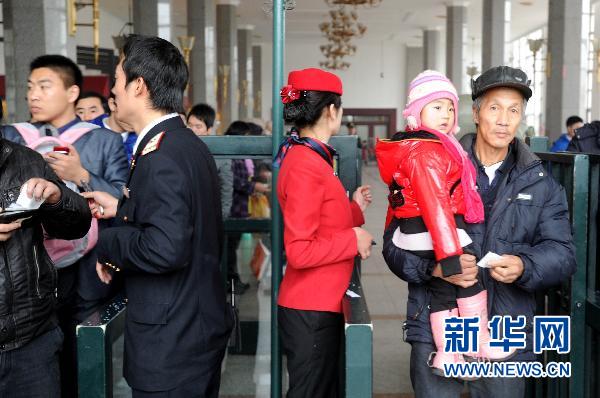Ticketing policy angers rail commuters
The Ministry of Railways explained on Monday that a newly revised regulation aims to prevent ticket scalping, after the public and the consumers' association criticized the change of ticketing policy.
|
|
The regulation that took effect on Dec 1 stipulates that passengers who want to take another train must make the change before the departure time on the ticket.
Those who miss their trains will not receive a refund or be allowed to change to other trains, unless they can provide evidence to prove that they were delayed by illness or an emergency.
The previous regulation allowed passengers to switch to other trains within two hours from the departure time.
"It's a quite unfair way to treat consumers, as there is no compensation policy for passengers when trains are delayed. To be fair, passengers need to be responsible for being late and railway departments need to be responsible for trains running late," said Zhao Jiaoli, secretary-general of the Shanghai Commission of Consumers' Rights and Interests Protection.
Passengers were further angered after the ministry said this new policy does not apply to ticket-holders on high-speed rail services, who can still change to other trains leaving on the same day within two hours from the departure time.
Many consumers argued that the rule was unfair because it created inequality between passengers who travel on regular trains and those who use high-speed trains. Others believe it is a way to push consumers to pay for high-speed rail services.
"I recognize it as a type of discrimination against regular train ticket-holders who don't buy the more expensive high-speed train tickets. We want to save money by buying cheaper tickets, not to risk being punished," said Jiang Chenbing, who works in Shanghai and was originally from Hunan province.
A ministry spokesman told Xinhua News Agency on Monday that the public has misunderstood the new policy.
He said the change in the policy aims to prevent ticket scalping, as the old policy allowed scalpers to sell tickets to those in need or get part of the ticket money refunded two hours after the trains had departed.
Those who miss trains because of illness or injury can still transfer to later trains, the official said.
A female staff member surnamed Dong from the Shanghai Railway Station said: "Passengers who missed trains due to illness or injury need to show valid medical proof to the head of the train station and, within two hours after the departure time on the ticket, they can change to other trains."
As for high-speed rail services, ticket-holders who want to change to a regular train or high-speed rail service on another day must also make the change before the departure time. They can enjoy the two-hour grace period only when changing to other high-speed trains on the same day, as passengers have plenty of choices, he said.
The change of policy is not likely to affect many people, as official statistics showed only 0.04 percent of total railway passengers ask to change their ticket after their trains depart.
Zhao Jiaoli said that she understood the purpose of the regulation was to prevent ticket scalping but said there should be better solutions to control scalping instead of "punishing" ordinary consumers.
Consumer associations suggested that the regulation should be improved by listening to the views of the public and considering the rights of consumers.
"There are many people traveling by trains so the new regulation raised heated debate among consumers. The railway departments had better pay more attention to feedback from consumers," said Zhao.
 0
0 







